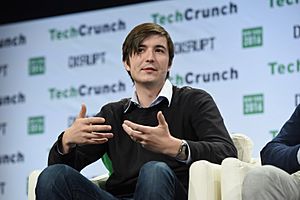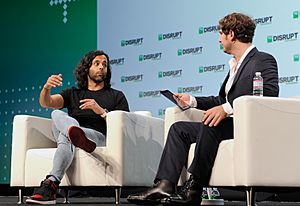Robinhood Markets facts for kids
 |
|
| Public company | |
| Traded as |
|
| Founded | April 18, 2013 |
| Founders |
|
| Headquarters |
,
U.S.
|
|
Key people
|
Vladimir Tenev (CEO) Baiju Bhatt (Chief creative officer) |
| Services | Stockbroker Electronic trading platform |
| Revenue | |
|
Operating income
|
|
| Total assets | |
| Total equity | |
|
Number of employees
|
2,300 (December 2022) |
| Subsidiaries |
|
Robinhood Markets, Inc. is an American financial services company headquartered in Menlo Park, California, that facilitates commission-free trades of stocks, exchange-traded funds and cryptocurrencies as well as individual retirement accounts via a mobile app introduced in March 2015. Robinhood is a FINRA-regulated broker-dealer, registered with the U.S. Securities and Exchange Commission, and is a member of the Securities Investor Protection Corporation. The company's revenue comes from three main sources: interest earned on customers' cash balances, selling order information to high-frequency traders and margin lending. As of March 2022[update], Robinhood had 22.8 million funded accounts and 15.9 million monthly active users. In April 2022, Robinhood rolled out a cryptocurrency wallet to more than 2 million users.
Contents
History
Robinhood was founded in April 2013 by Vladimir Tenev and Baiju Bhatt, who had previously built high-frequency trading platforms for financial institutions in New York City. The company's name comes from its mission to "provide everyone with access to the financial markets, not just the wealthy". Tenev noted that executing a trade cost brokerages "fractions of a penny" but they typically charged fees of $5 to $10 per trade, as well as required account minimums of $500 to $5,000.
The firm showcased its app publicly for the first time at LA Hacks, first published it on AppStore in December 2014 and then officially launched the app in March 2015.
As of January 2015, 80% of the firm's customers belonged to the "Millennial" demographic and the average customer age was 26. Fifty percent of users who have made a trade use the app daily and 90% use the app weekly. As of 2022, Robinhood had 22.8 million funded accounts and 15.9 million monthly active users.
In April 2017, Robinhood raised $110 million at a $1.3 billion valuation led by Yuri Milner of DST Global, Greenoaks Capital, and Thrive Capital.
On May 10, 2018, Robinhood closed a $363 million Series D financing round led by DST Global. As of May 2018[update], Robinhood raised a total of $539 million in venture capital funding, with the last valuation at $5.6 billion, up from their previous valuation of $1.3 billion.
In February 2018, the company announced that it would be moving its headquarters from Palo Alto to the former headquarters of Sunset magazine in Menlo Park.
In May 2019, reports from Bloomberg and other outlets publicized Robinhood's pursuit of an additional $200 million in funding, which could value the company in the $7 billion to $10 billion range. In November 2019, Robinhood announced its expansion to the United Kingdom.
During the 2020 stock market crash, Robinhood trading increased. The subsequent market rise was partially attributed to Robinhood traders, but a study indicated that Robinhood traders had little daily impact on major shares.
In May 2020, it was announced that Robinhood had raised $280 million in venture funding at a pre-money valuation of $8.3 billion led by Sequoia Capital, and 3 months later, the company announced a $200 million Series G funding round from a new investor, D1 Capital Partners, on August 17.
In late June 2021, Robinhood was fined $57 million by the FINRA and was ordered to pay $13 million in restitution to clients affected by outages and misleading communications in March 2020. This was the largest-ever FINRA penalty in the history of the organization.
The company went public on the Nasdaq on July 29, 2021, under the stock ticker HOOD. The opening price was $38, but dropped shortly afterwards to a low of $33.35 before starting to recover, reaching an all time high at $85. Subsequently, it fell again after facing growing regulatory uncertainty, Q3 earnings, and disclosing a security breach.
In 2022 Robinhood shrunk staffing levels, which gained widespread media attention. The first wave of layoffs occurred in April, with the company cutting its workforce by 9%. More significant were Robinhood's layoff announcement released simultaneously with its 2022 Q2 earnings on August 2, in which Tenev announced the company would layoff 23% of its workforce, mostly in operations, marketing and program management. From January to August 2022, Robinhood's stock shed 48% of its value.
In August 2022, Robinhood's cryptocurrency division was fined $30 million by the New York State Department of Financial Services for allegedly violating anti-money-laundering and cybersecurity regulations, in the department's first crypto enforcement action.
In May 2022 Alameda Research disclosed a 7.6% share in Robinhood. According to anonymous sources cited by Reuters in November 2022, Alameda used Robinhood shares as part of its collateral for a transfer of at least $4 billion from FTX. Regulators seized the shares during the bankruptcy of FTX, and Robinhood petitioned regulators to buy back the shares.
In December 2022 Robinhood launched Individual Retirement Accounts (IRAs), including a 1% match. In April 2023 Robinhood launched Robinhood Connect, creating an integrated an on-ramp to crypto wallets.
On 1 May 2023, Robinhood added a bankruptcy tag to AMC stock for three minutes. AMC chairman and CEO Adam Aron said he was considering suing Robinhood for its "incomprehensible incompetence".
On 22 June 2023, Robinhood announced it had agreed to buy X1, a credit card issuance startup that offers a no-fee, income-based credit card with rewards, for $95 million. On completion of the acquisition, X1's co-founders Siddharth Batra and Deepak Rao would oversee Robinhood's new credit card business.
Products and services
Stock and ETF trading
Robinhood's original product was commission-free trades of stocks and exchange-traded funds. In February 2016, Robinhood introduced instant deposits, crediting users instantly for deposits up to $1,000; previously, funds took three days to appear via ACH transfer. In September 2016 they launched Robinhood Gold, a premium subscription plan that offers up to $50,000 in instant deposits, margin trading, and more market analytics. As of February 2017, the company had executed over $30 billion in trades. In August 2017, the company began offering free stocks in exchange for referring new users. In December 2017, options trading was introduced. Robinhood launched retirement accounts in January 2023. Services not offered include mutual funds and bonds.
Robinhood supports trading stocks and ETFs listed on the Nasdaq and New York Stock Exchange, and select over-the-counter securities. In August 2018, Robinhood introduced support for American depositary receipts, adding 250 highly searched international stocks. Robinhood has prohibited its users from purchasing some high-risk penny stocks, such as banning purchases of Helios and Matheson Analytics, the owner of MoviePass, in August 2018.
In October 2019, several major brokerages such as E-Trade, TD Ameritrade, and Charles Schwab announced in quick succession they were eliminating trading fees. Competition with Robinhood was cited as a reason. Charles R. Schwab, however, said that it was within his brokerage's intentions to eventually eliminate trading fees, as the firm had historically been a discount broker. Support for purchasing fractional shares and automatic dividend reinvestment was introduced in December 2019. Automatic recurring investments were introduced in May 2020. Access to initial public offering (IPO) shares was introduced in May 2021.
In March 2022, Robinhood announced it was adding four additional hours to extended trading for clients. In a push to eventually provide 24/7 equities trading, Robinhood said it will be available from 7:00 AM to 8:00 PM ET. In May 2022, Robinhood announced the launch of a stock lending program, allowing users to give Robinhood permission to lend out any fully paid stocks in their portfolio.
Cryptocurrency trading
On January 25, 2018, Robinhood announced a waitlist for commission-free cryptocurrency trading. By the end of the first day, the waitlist had grown to more than 1,250,000. Robinhood began offering trading of Bitcoin and Ethereum to users in California, Massachusetts, Missouri, and Montana in February 2018. In May 2018, Robinhood expanded its trading platform to Wisconsin and New Mexico. By 2021, cryptocurrency trading was available in every state except Hawaii and Nevada.
Robinhood later added trading for Bitcoin Cash, Dogecoin, Ethereum Classic and Litecoin. In September 2021, automatic recurring investments was introduced and Robinhood launched a waitlist for cryptocurrency wallets. CEO Vladamir Tenev stated that Robinhood may add more coins, saying, "We feel very very good about the coins that we’re currently listing on our platform and any new coins that we add we want to feel equally, if not more good." In April 2022, Robinhood announced that it had rolled out cryptocurrency wallets to every eligible person on its waitlist of over 2 million customers, and added trading for Shiba Inu, Solana, Compound, Chainlink and Polygon. Also in April 2022, the company announced integration of Bitcoin’s Lightning Network to enable faster transactions involving the cryptocurrency. In June 2023, Robinhood delisted Solana, Cardano and Polygon.
Banking
In June 2018, it was reported that Robinhood was in talks to obtain a U.S. banking license, with a spokesperson from the company claiming the company was in "constructive" talks with the U.S. OCC. In December 2018, Robinhood announced checking and savings accounts, with debit cards issued by Ohio-based Sutton Bank would be available in early 2019. Robinhood claimed the accounts would have a 3% annual interest rate; at the time of the announcement, the highest interest rate on a savings account from a licensed bank was 2.36%. Robinhood initially claimed the accounts would be SIPC insured, which the SIPC denied. The products were rebranded as "Cash Management" the next day. In January 2019, the waitlist and sign-up page were removed from the app.
A Cash Management feature was announced in October 2019, with FDIC insurance from various partner banks and an annual 2.05% interest rate, though lowered before launch to 1.8% after a federal rate cut. The feature launched in December 2019. In March 2022, Robinhood launched the Robinhood Cash Card, a debit card that allows users to automatically invest in assets like stocks and crypto when spending money. With the launch of the Cash Card, the company retired its Cash Management debit card.
Retirement accounts
In January 2023, Robinhood introduced traditional individual retirement accounts (IRAs) and Roth IRAs. Robinhood matches 1% of eligible contributions that customers put into their IRA.
See also
 In Spanish: Robinhood (empresa) para niños
In Spanish: Robinhood (empresa) para niños



